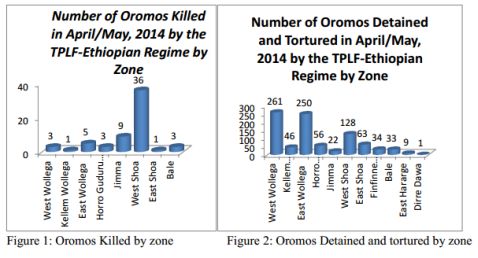
“Because I am Oromo”: A Sweeping Repression in Oromia… full report @:http://www.amnesty.org/en/library/info/AFR25/006/2014/en
SUMMARY: REPRESSION OF DISSENT IN OROMIA
“I was arrested for about eight months. Some school students had been arrested, so their classmates had a demonstration to ask where they were and for them to be released. I was accused of organising the demonstration because the government said my father supported the OLF so I did too and therefore I must be the one who is organising the students.”
Young man from Dodola Woreda, Bale Zone1The anticipation and repression of dissent in Oromia manifests in many ways. The below are some of the numerous and varied individual stories contained in this report:
A student told Amnesty International how he was detained and tortured in Maikelawi Federal Police detention centre because a business plan he had prepared for a competition was alleged to be underpinned by political motivations. A singer told how he had been detained, tortured and forced to agree to only sing in praise of the government in the future. A school girl told Amnesty International how she was detained because she refused to give false testimony against someone else. A former teacher showed Amnesty International where he had been stabbed and blinded in one eye with a bayonet during torture in detention because he had refused to ‘teach’ his students propaganda about the achievements of the ruling political party as he had been ordered
to do. A midwife was arrested for delivering the baby of a woman who was married to an alleged member of the Oromo Liberation Front. A young girl told Amnesty International how she had successively lost both parents and four brothers through death in detention, arrest or disappearance until, aged 16, she was left alone caring for two young siblings. An agricultural expert employed by the government told how he was arrested on the accusation he had incited a series of demonstrations staged by hundreds of farmers in his area, because his job involved presenting the grievances of the farmers to the government.In April and May 2014, protests broke out across Oromia against a proposed ‘Integrated Master Plan’ to expand the capital, Addis Ababa, into Oromia regional territory. The protests were led by students, though many other people participated. Security services, comprised of federal police and the military special forces, responded to the protests with unnecessary and excessive force, firing live ammunition on peaceful protestors in a number of locations and beating hundreds of peaceful protestors and bystanders, resulting in dozens of deaths and scores of injuries. In the wake of the protests, thousands of people were arrested.
These incidents were far from being unprecedented in Oromia. They were the latest and bloodiest in a long pattern of the suppression – sometimes pre-emptive and often brutal – of even suggestions of dissent in the region. The Government of Ethiopia is hostile to dissent, wherever and however it manifests, and also shows hostility to influential individuals or groups not affiliated to the ruling Ethiopian Peoples’ Revolutionary Democratic Front (EPRDF) political party. The government has used arbitrary arrest and detention, often without charge, to suppress suggestions of dissent in many parts of the country. But this hostility, and the resulting acts of suppression, have manifested often and at scale in Oromia. A number of former detainees, as well as former officials, have observed that Oromos make up a high proportion of the prison population in federal prisons and in the Federal Police Crime Investigation and Forensic Sector, commonly known as Maikelawi, in Addis Ababa, where prisoners of conscience and others subject to politically-motivated detention are often detained when first arrested. Oromos also constitute a high proportion of Ethiopian refugees. According to a 2012 Inter-Censal Population Survey, the Oromo constituted 35.3% of Ethiopia’s population. However, this numerical size alone does not account for the high proportion of Oromos in the country’s prisons, or the proportion of Oromos among Ethiopians fleeing the country. Oromia and the Oromo have long been subject to repression based on a widespread imputed opposition to the EPRDF which, in conjunction with the size of the population, is taken as posing a potential political threat to the government. Between 2011 and 2014, at least 5,000 Oromos have been arrested as a result of their actual or suspected peaceful opposition to the government, based on their manifestation of dissenting opinions, exercise of freedom of expression or their imputed political opinion. These included thousands of peaceful protestors and hundreds of political opposition members, but also hundreds of other individuals from all walks of life – students, pharmacists, civil servants, singers, business people and people expressing their Oromo cultural heritage – arrested based on the expression of dissenting opinions or their suspected opposition to the government. Due to restrictions on human rights reporting, independent journalism and information exchange in Ethiopia, as well as a lack of transparency on detention practices, it is possible there are many additional cases that have not been reported or documented. In the cases known to Amnesty International, the majority of those arrested were detained without charge or trial for some or all of their detention, for weeks,
months or years – a system apparently intended to warn, punish punish or silence them, from which justice is often absent.
Openly dissenting individuals have been arrested in large numbers. Thousands of Oromos have been arrested for participating in peaceful protests on a range of issues. Large-scale arrests were seen during the protests against the ‘Master Plan’ in 2014 and during a series of protests staged in 2012-13 by the Muslim community in Oromia and other parts of the country against alleged government interference in Islamic affairs. In addition, Oromos have been arrested for participation in peaceful protests over job opportunities, forced evictions, the price of fertilizer, students’ rights, the teaching of the Oromo language and the arrest or extra-judicial executions of farmers, students, children and others targeted for expressing dissent, participation in peaceful protests or based on their imputed political opinion. Between 2011 and 2014, peaceful protests have witnessed several incidents of the alleged use of unnecessary and excessive force by security services against unarmed protestors.
Hundreds of members of legally-registered opposition political parties have also been arrested in large sweeps that took place in 2011 and in 2014, as well as in individual incidents.In addition to targeting openly dissenting groups, the government also anticipates dissent amongst certain groups and individuals, and interprets certain actions as signs of dissent. Students in Oromia report that there are high levels of surveillance for signs of dissent or political activity among the student body in schools and universities. Students have been arrested based on their actual or suspected political opinion, for refusing to join the ruling party or their participation in student societies, which are treated with hostility on the suspicion that they are underpinned by political motivations. Hundreds of students have also been arrested for participation in peaceful protests.
Expressions of Oromo culture and heritage have been interpreted as manifestations of dissent, and the government has also shown signs of fearing cultural expression as a potential catalyst for opposition to the government. Oromo singers, writers and poets have been arrested for allegedly criticising the government and/or inciting people through their work. People wearing traditional Oromo clothing have been arrested on the accusation that this demonstrated a political agenda. Hundreds of people have been arrested at Oromo traditional festivals.
Members of these groups – opposition political parties, student groups, peaceful protestors, people promoting Oromo culture and people in positions the government believes could have influence on their communities – are treated with hostility not only due to their own actual or perceived dissenting behaviour, but also due to their perceived potential to act as a conduit or catalyst for further dissent. A number of people arrested for actual or suspected dissent told Amnesty International they were accused of the ‘incitement’ of others to oppose the government.
The majority of actual or suspected dissenters who had been arrested in Oromia interviewed by Amnesty International were accused of supporting the Oromo Liberation Front (OLF) – the armed group that has fought a long-term low-level insurgency in the region, which was proscribed as a terrorist organization by the Ethiopian parliament in June 2011. The accusation of OLF support has often been used as a pretext to silence individuals openly exercising dissenting behaviour such as membership of an opposition political party or participation in a peaceful protest. However, in addition to targeting demonstrators, students,members of opposition political parties and people celebrating Oromo culture based on their actual or imputed political opinion, the government frequently demonstrates that it anticipates dissenting political opinion widely among the population of Oromia. People from all walks of life are regularly arrested based only on their suspected political opinion – on the accusation they support the OLF. Amnesty International interviewed medical professionals, business owners, farmers, teachers, employees of international NGOs and many others who had been arrested based on this accusation in recent years. These arrests were often based on suspicion alone, with little or no supporting evidence.
Certain behaviour arouses suspicion, such as refusal to join the ruling political party or movement around or in and out of the region. Some people ‘inherit’ suspicion from their parents or other family members. Expressions of dissenting opinions within the Oromo party in the ruling coalition – the Oromo People’s Democratic Organization (OPDO) – have also been responded to with the accusation that the dissenter supports the OLF. Family members have also been arrested in lieu of somebody else wanted for actual or suspected dissenting behaviour, a form of collective punishment illegal under international law.
In some of these cases too, the accusation of OLF support and arrest on that basis appears to be a pretext used to warn, control or punish signs of ‘political disobedience’ and people who have influence over others and are not members of the ruling political party. But the constant repetition of the allegation suggests the government continues to anticipate a level of sympathy for the OLF amongst the Oromo population writ large. Further, the government appears to also believe that the OLF is behind many signs of peaceful dissent in the region.
However, in numerous cases, the accusation of supporting the OLF and the resulting arrest do not ever translate into a criminal charge. The majority of all people interviewed by Amnesty International who had been arrested for their actual or suspected dissenting behaviour or political opinion said that they were detained without being charged, tried or going to court to review the legality of their detention, in some cases for months or years. Frequently, therefore, the alleged support for the OLF remains unsubstantiated and unproven. Often, it is merely an informal allegation made during the course of interrogation. Further, questions asked of actual or suspected dissenters by interrogators in detention also suggest that the exercise of certain legal rights –for example, participation in a peaceful protest – is taken as evidence of OLF support. A number of people interviewed by Amnesty International had been subjected to repeated arrest on the same allegation of of being anti-government or of OLF support, without ever being charged.
Amnesty International interviewed around 150 Oromos who were targeted for actual or suspected dissent. Of those who were arrested on these bases, the majority said they were subjected to arbitrary detention without judicial review, charge or trial, for some or all of the period of their detention, for periods ranging from several days to several years. In the majority of those cases, the individual said they were arbitrarily detained for the entire duration of their detention. In fewer cases, though still reported by a notable number of interviewees, the detainee was held arbitrarily – without charge or being brought before a court – during an initial period that again ranged from a number of weeks to a number of years, before the detainee was eventually brought before a court.
A high proportion of people interviewed by Amnesty International were also held incommunicado – denied access to legal representation and family members and contact with the outside world – for some or all of their period of detention. In many of these cases, the detention amounted to enforced disappearance, such as where lack of access to legal counsel and family members and lack of information on the detainee’s fate or whereabouts placed a detainee outside the protection of the law. them again. The family continued to be ignorant of their fate and did not know whether they were alive or dead.Many people reported to Amnesty International that, after their family members had been arrested, they had never heard from.
Arrests of actual or suspected dissenters in Oromia reported to Amnesty International were made by local and federal police, the federal military and intelligence officers, often without a warrant. Detainees were held in Kebele, Woreda and Zonal3 detention centres, police stations, regional and federal prisons. However, a large proportion of former detainees interviewed by Amnesty International were detained in unofficial places of detention, mostly in military camps throughout the region. In some cases apparently considered more serious, detainees were transferred to Maikelawi in Addis Ababa. Arbitrary detention without charge or trial was reported in all of these places of detention.
Almost all people interviewed by Amnesty International who had been detained in military camps or other unofficial places of detention said their detention was not subject to any form of judicial review. All detainees in military camps in Oromia nterviewed by Amnesty International experienced some violations of the rights and protections of due process and a high proportion of all interviewees who had been detained in a military camp reported torture, including rape, and other ill-treatment.
Actual or suspected dissenters have been subjected to torture in federal and regional detention centres and prisons, police stations, including Maikelawi, military camps and other unofficial places of detention. The majority of former detainees interviewed by Amnesty International, arrested based on their actual or imputed political opinion, reported that they had been subjected to treatment amounting to torture and other cruel, inhuman or degrading treatment, in most cases repeatedly, while in detention or had been subjected to treatment that amounts to torture or ill-treatment in and around their homes. Frequently reported methods of torture were beating, particularly with fists, rubber batons, wooden or metal sticks or gun butts, kicking, tying in contorted stress positions often in conjunction with beating on the soles of the feet, electric shocks, mock execution or death threats involving a gun, beating with electric wire, burning, including with heated metal or molten plastic, chaining or tying hands or ankles together for extended periods (up to several months), rape, including gang rape, and extended solitary confinement. Former detainees repeatedly said that they were coerced, in many cases under torture or the threat of torture, to provide a statement or confession or incriminating evidence against others.
Accounts of former detainees interviewed by Amnesty International consistently demonstrate that conditions in detention in regional and federal police stations, regional and federal prisons, military camps and other unofficial places of detention, violate international law and national and international standards. Cases of death in detention were reported to Amnesty International by former fellow detainees or family members of detainees. These deaths were reported to result from torture, poor detention conditions and lack of medical assistance. Some of these cases may amount to extra-judicial executions, where the detainees died as a result of torture or the intentional deprivation of food or medical assistance.There is no transparency or oversight of this system of arbitrary detention, and no independent investigation of allegations of torture and other violations in detention. No independent human rights organizations that monitor and publically document violations have access to detention centres in Ethiopia.
In numerous cases, former detainees interviewed by Amnesty International also said their release from arbitrary detention was premised on their agreement to a set of arbitrary conditions unlawfully imposed by their captors rather than by any judicial procedure, and many of which entailed foregoing the exercise of other human rights, such as those to the freedoms of expression, association and movement. Failure to uphold the conditions, detainees were told, could lead to re-arrest or worse. Regularly cited conditions included: not participating in demonstrations or other gatherings, political meetings or student activities; not meeting with more than two or three individuals at one time; not having any contact with certain people, including spouses or family members wanted by the authorities for alleged dissenting behaviour; or not leaving the area where they lived without seeking permission from local authorities. For a number of people interviewed by Amnesty International, it was the difficulty of complying with these conditions and the restricting impact they had on their lives, or fear of the consequences if they failed to comply, intentionally or unintentionally, that caused them to flee the country.
The testimonies of people interviewed by Amnesty International, as well as information received from a number of other sources and legal documents seen by the organization, indicate a number of fair trial rights are regularly violated in cases of actual or suspected Oromo dissenters that have gone to court, including the rights to a public hearing, to not be compelled to incriminate oneself, to be tried without undue delay and the right to presumption of innocence. Amnesty International has also documented cases in which the lawful exercise of the right to freedom of expression, or other protected human rights, is cited as evidence of illegal support for the OLF in trials. Amnesty International also received dozens of reports of actual or suspected dissenters being
killed by security services, in the context of security services’ response to protests, during the arrests of actual or suspected dissidents, and while in detention. Some of these killings may amount to extra-judicial executions. A multiplicity of both regional and federal actors are involved in committing human rights violations against actual or suspected dissenters in Oromia, including civilian administrative officials, local police, federal police, local militia, federal military and intelligence services,
with cooperation between the different entities, including between the regional and federal levels.
Because of the many restrictions on human rights organizations and on the freedoms of association and expression in Ethiopia, arrests and detentions are under-reported and almost no sources exist to assist detainees and their families in accessing justice and pressing for remedies and accountability for human rights violations.The violations documented in this report take place in an environment of almost complete impunity for the perpetrators. Interviewees regularly told Amnesty International that it was either not possible or that there was no point in trying to complain, seek answers or seek justice in cases of enforced disappearance, torture, possible extra-judicial execution or other violations. Many feared repercussions for asking. Some were arrested when they did ask about a relative’s fate or whereabouts.
As Ethiopia heads towards general elections in 2015, it is likely that the government’s efforts to suppress dissent, including through the use of arbitrary arrest and detention and other violations, will continue unabated and may even increase. The Ethiopian government must take a number of urgent and substantial measures to ensure no-one is arrested, detained, charged, tried, convicted or sentenced on account of the peaceful exercise of their rights to the freedoms of expression, association and assembly, including the right to peacefully assemble to protest, or based on their imputed political opinion; to end unlawful practices of arbitrary detention without charge or trial, incommunicado detention without access to the outside world, detention in unofficial detention centres, and enforced disappearance; and to address the prevalence of torture and other ill-treatment in Ethiopia’s detention centres. All allegations of torture, incidents involving allegations of the unnecessary or excessive use of force by security services against peaceful protestors, and all suspected cases of extra-judicial executions must be urgently and
properly investigated. Access to all prisons and other places of detention and to all prisoners should be extended to appropriate independent, non-governmental bodies, including international human rights bodies.
Donors with existing funding programmes working with federal and regional police, with the military or with the prison system, should carry out thorough and impartial investigations into allegations of human rights violations within those institutions, to ensure their funding is not contributing to the commission of human rights violations. Further, the international community should accord the situation in Ethiopia the highest possible level of scrutiny. Existing domestic investigative and accountability mechanisms have proved not capable of carrying out investigations that are independent, adequate, prompt, open to public scrutiny and which sufficiently involve victims. Therefore, due to the apparent existence of an entrenched pattern of violations in Ethiopia and due to concerns over the impartiality of established domestic investigative procedures, there is a substantial
and urgent need for intervention by regional and international human rights bodies to conduct independent investigations into allegations of widespread human rights violations in Oromia, as well as the rest of Ethiopia. Investigations should be pursued through the establishment of an independent commission of inquiry, fact-finding mission or comparable procedure, comprised of independent international experts, under the auspices of the United Nations Human Rights Council or the African Commission on Human and Peoples’ Rights.See full report @http://www.amnesty.org/en/library/asset/AFR25/006/2014/en/539616af-0dc6-43dd-8a4f-34e77ffb461c/afr250062014en.pdf
Amnesty International’s report titled, “‘Because I Am Oromo’: A Sweeping Repression in Oromia …” can be accessed here.
Read also other media sources reporting:
http://http://unpo.org/article.php?id=17650
http://http://m.voanews.com/a/amnesty-ethiopia-systematically-repressing-oromo/2498866.html
http://www.bbc.co.uk/news/world-africa-29799484
http://www.tesfanews.net/amnesty-says-ethiopia-detains-5000-oromos-illegally-since-2011/
http://ayyaantuu.com/human-rights/amnesty-ethiopia-systematically-repressing-oromo/
http://www.elwatannews.com/news/details/586125
http://mobi.iafrica.com/world-news/2014/10/28/ethiopia-torturing-ethnic-group/
http://www.warscapes.com/opinion/oromoprotests-perspective
http://news.yahoo.com/ethiopia-torturing-opposition-ethnic-group-amnesty-100724983.html
http://america.aljazeera.com/articles/2014/10/28/ethiopia-oromo-amnesty.html
http://www.thetimes.co.uk/tto/news/politics/article4250755.ece
http://www.sudantribune.com/spip.php?article52880
http://www.noticiasaominuto.com/mundo/297457/etiopia-acusada-de-perseguir-a-etnia-oromo
http://lepersoneeladignita.corriere.it/2014/10/28/etiopia-persecuzione-senza-fine-ai-da
http://maliactu.net/lethiopie-torture-les-oromo-les-accusant-dopposition-au-gouvernement/
http://www.kleinezeitung.at/nachrichten/politik/3783541/aethiopien-geht-gnadenlos-gegen-o
Does British aid to Africa help the powerful more than the poor?
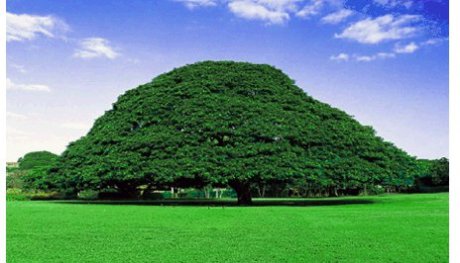



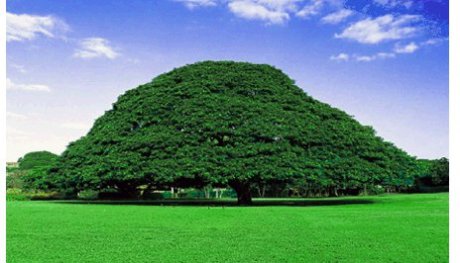
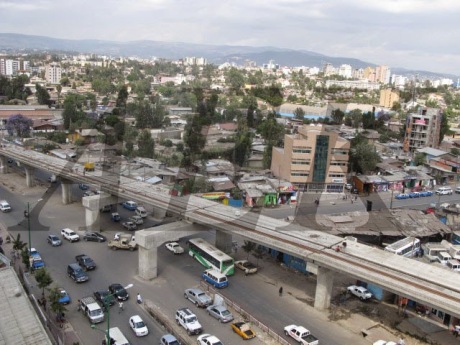
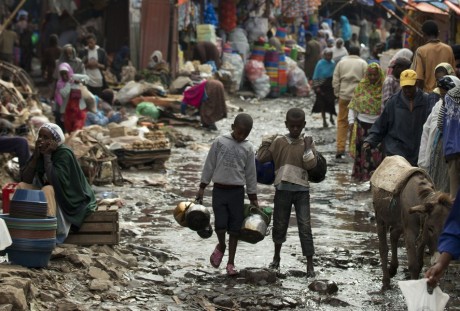




 Working Group Must Address Trade Misinvoicing and Role of U.S. Business and Government in Facilitating Illicit Finance to Be Truly Effective, Warns GFI
Working Group Must Address Trade Misinvoicing and Role of U.S. Business and Government in Facilitating Illicit Finance to Be Truly Effective, Warns GFI



